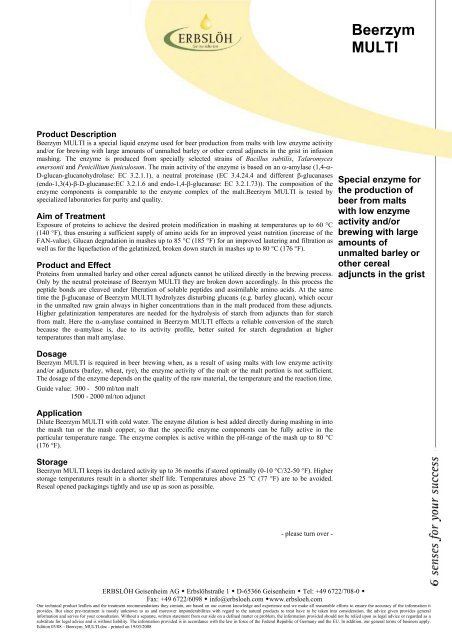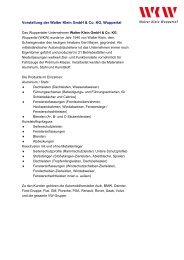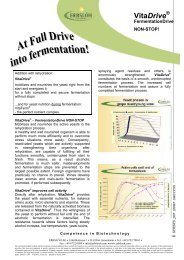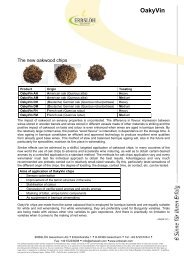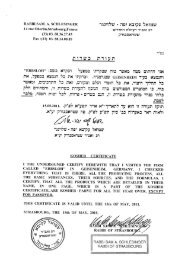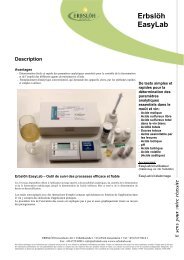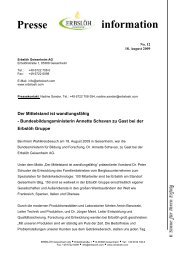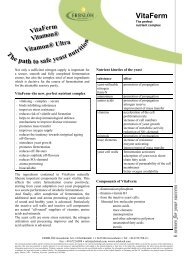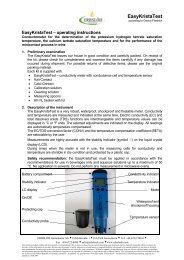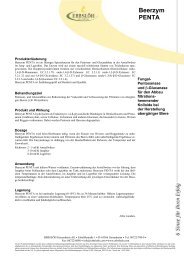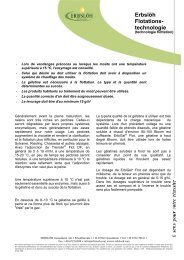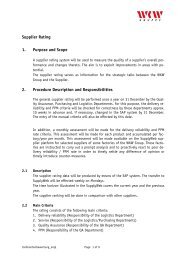Beerzym MULTI
Beerzym MULTI
Beerzym MULTI
You also want an ePaper? Increase the reach of your titles
YUMPU automatically turns print PDFs into web optimized ePapers that Google loves.
Product Description<br />
<strong>Beerzym</strong> <strong>MULTI</strong> is a special liquid enzyme used for beer production from malts with low enzyme activity<br />
and/or for brewing with large amounts of unmalted barley or other cereal adjuncts in the grist in infusion<br />
mashing. The enzyme is produced from specially selected strains of Bacillus subtilis, Talaromyces<br />
emersonii and Penicillium funiculosum. The main activity of the enzyme is based on an α-amylase (1,4-α-<br />
D-glucan-glucanohydrolase: EC 3.2.1.1), a neutral proteinase (EC 3.4.24.4 and different β-glucanases<br />
(endo-1,3(4)-β-D-glucanase:EC 3.2.1.6 and endo-1,4-β-glucanase: EC 3.2.1.73)). The composition of the<br />
enzyme components is comparable to the enzyme complex of the malt.<strong>Beerzym</strong> <strong>MULTI</strong> is tested by<br />
specialized laboratories for purity and quality.<br />
Aim of Treatment<br />
Exposure of proteins to achieve the desired protein modification in mashing at temperatures up to 60 °C<br />
(140 °F), thus ensuring a sufficient supply of amino acids for an improved yeast nutrition (increase of the<br />
FAN-value). Glucan degradation in mashes up to 85 °C (185 °F) for an improved lautering and filtration as<br />
well as for the liquefaction of the gelatinized, broken down starch in mashes up to 80 °C (176 °F).<br />
Product and Effect<br />
Proteins from unmalted barley and other cereal adjuncts cannot be utilized directly in the brewing process.<br />
Only by the neutral proteinase of <strong>Beerzym</strong> <strong>MULTI</strong> they are broken down accordingly. In this process the<br />
peptide bonds are cleaved under liberation of soluble peptides and assimilable amino acids. At the same<br />
time the β-glucanase of <strong>Beerzym</strong> <strong>MULTI</strong> hydrolyzes disturbing glucans (e.g. barley glucan), which occur<br />
in the unmalted raw grain always in higher concentrations than in the malt produced from these adjuncts.<br />
Higher gelatinization temperatures are needed for the hydrolysis of starch from adjuncts than for starch<br />
from malt. Here the α-amylase contained in <strong>Beerzym</strong> <strong>MULTI</strong> effects a reliable conversion of the starch<br />
because the α-amylase is, due to its activity profile, better suited for starch degradation at higher<br />
temperatures than malt amylase.<br />
Dosage<br />
<strong>Beerzym</strong> <strong>MULTI</strong> is required in beer brewing when, as a result of using malts with low enzyme activity<br />
and/or adjuncts (barley, wheat, rye), the enzyme activity of the malt or the malt portion is not sufficient.<br />
The dosage of the enzyme depends on the quality of the raw material, the temperature and the reaction time.<br />
Guide value: 300 - 500 ml/ton malt<br />
1500 - 2000 ml/ton adjunct<br />
Application<br />
Dilute <strong>Beerzym</strong> <strong>MULTI</strong> with cold water. The enzyme dilution is best added directly during mashing in into<br />
the mash tun or the mash copper, so that the specific enzyme components can be fully active in the<br />
particular temperature range. The enzyme complex is active within the pH-range of the mash up to 80 °C<br />
(176 °F).<br />
Storage<br />
<strong>Beerzym</strong> <strong>MULTI</strong> keeps its declared activity up to 36 months if stored optimally (0-10 °C/32-50 °F). Higher<br />
storage temperatures result in a shorter shelf life. Temperatures above 25 °C (77 °F) are to be avoided.<br />
Reseal opened packagings tightly and use up as soon as possible.<br />
- please turn over -<br />
<strong>Beerzym</strong><br />
<strong>MULTI</strong><br />
Special enzyme for<br />
the production of<br />
beer from malts<br />
with low enzyme<br />
activity and/or<br />
brewing with large<br />
amounts of<br />
unmalted barley or<br />
other cereal<br />
adjuncts in the grist<br />
ERBSLÖH Geisenheim AG � Erbslöhstraße 1 � D-65366 Geisenheim � Tel: +49 6722/708-0 �<br />
Fax: +49 6722/6098 � info@erbsloeh.com �www.erbsloeh.com<br />
Our technical product leaflets and the treatment recommendations they contain, are based on our current knowledge and experience and we make all reasonable efforts to ensure the accuracy of the information it<br />
provides. But since pre-treatment is mostly unknown to us and moreover imponderabilities with regard to the natural products to treat have to be taken into consideration, the advice given provides general<br />
information and serves for your consultation. Without a separate, written statement from our side on a defined matter or problem, the information provided should not be relied upon as legal advice or regarded as a<br />
substitute for legal advice and is without liability. The information provided is in accordance with the law in force of the Federal Republic of Germany and the EU. In addition, our general terms of business apply.<br />
Edition 03/08 – <strong>Beerzym</strong>_<strong>MULTI</strong>.doc - printed on 19/03/2008
General Characteristics<br />
Enzyme characteristics: the activity range of the enzyme is between pH 3.0 and 8.0 for all activities of the<br />
enzyme complex, the optimum ranges from pH 5.0 to 7.0 in the presence of substrate. The temperature<br />
range is between 30 °C (86 °F) and 90 °C (194 °F) for the α-amylase, the temperature optimum is at 70-80<br />
°C (158-176 °F) in the presence of substrate, calcium and at an optimal pH-value. For the neutral proteinase<br />
the temperature range is between 15 °C (59 °F) and 70 °C (158 °F) with an optimum at 45-55 °C (113-131<br />
°F). For the β-glucanases the temperature range is between 25 °C (59 °F) and 85 °C (185 °F) with one<br />
optimum at 80 °C (176 °F) and the other at 60 °C (140 °F).<br />
The diagrammes 1 and 2 show the influence of temperature and pH-value on the α-amylase activity, the<br />
diagrammes 3 and 4 show the influence of temperature and pH-value on the proteinase activity of<br />
<strong>Beerzym</strong> <strong>MULTI</strong>.<br />
relative activity [%]<br />
100<br />
80<br />
60<br />
40<br />
20<br />
0<br />
30 40 50 60 70 80 90<br />
temp. [ o C]<br />
0<br />
3 4 5 6 7 8 9<br />
Fig 1: Influence of temperature on α-amylase Fig 2: Influence of pH-value on the α-amylase<br />
activity (16% starch, pH 6.0) activity (16% starch; 70 °C/158 °F)<br />
relative activity [%]<br />
100<br />
80<br />
60<br />
40<br />
20<br />
0<br />
20 30 40 50 60 70<br />
temp. [ o C]<br />
Fig 3: Influence of temperature on neutral Fig 4: Influence of pH-value on neutral<br />
proteinase activity proteinase activity<br />
(2% casein solution; pH 7.0). (2% casein solution; 55 °C/131 °F).<br />
relative activity [%]<br />
relative activity [%]<br />
100<br />
80<br />
60<br />
40<br />
20<br />
100<br />
80<br />
60<br />
40<br />
20<br />
<strong>Beerzym</strong><br />
<strong>MULTI</strong><br />
ERBSLÖH Geisenheim AG � Erbslöhstraße 1 � D-65366 Geisenheim � Tel: +49 6722/708-0 �<br />
Fax: +49 6722/6098 � info@erbsloeh.com �www.erbsloeh.com<br />
Our technical product leaflets and the treatment recommendations they contain, are based on our current knowledge and experience and we make all reasonable efforts to ensure the accuracy of the information it<br />
provides. But since pre-treatment is mostly unknown to us and moreover imponderabilities with regard to the natural products to treat have to be taken into consideration, the advice given provides general<br />
information and serves for your consultation. Without a separate, written statement from our side on a defined matter or problem, the information provided should not be relied upon as legal advice or regarded as a<br />
substitute for legal advice and is without liability. The information provided is in accordance with the law in force of the Federal Republic of Germany and the EU. In addition, our general terms of business apply.<br />
Edition 03/08 – <strong>Beerzym</strong>_<strong>MULTI</strong>.doc - printed on 19/03/2008<br />
pH<br />
0<br />
4 5 6 7 8 9 10<br />
pH
Continuing: General Characteristics<br />
The diagrammes 5, 6, 7 and 8 show the influence of temperature and pH-value on the different βglucanases<br />
of <strong>Beerzym</strong> <strong>MULTI</strong>.<br />
relative activity [%]<br />
0<br />
1 2 3 4 5 6 7<br />
Fig 5: Influence of temperature on heatstable Fig 6: Influence of pH-value on heatstable<br />
ß-glucanase activity ß-glucanase activity<br />
(barley-β-glucan, pH 4.5). (barley-β-glucan, 75 °C/167 °F).<br />
relative activity [%]<br />
100<br />
80<br />
60<br />
40<br />
20<br />
0<br />
40 50 60 70 80 90<br />
100<br />
80<br />
60<br />
40<br />
20<br />
temp. [ o C]<br />
0<br />
20 30 40 50 60 70 80<br />
temp. [ o C]<br />
Fig 7: Influence of temperature on heat tolerant Fig 8: Influence of pH-value on heat tolerant<br />
β-glucanase activity β-glucanase activity<br />
(barley-ß-glucan, pH 5.0). (barley-ß-glucan, 55 °C/131 °F).<br />
Please note:<br />
When applying <strong>Beerzym</strong> <strong>MULTI</strong> the food regulations of the individual countries currently in force have to<br />
be adhered to.<br />
relative activity [%]<br />
relative activity [%]<br />
100<br />
80<br />
60<br />
40<br />
20<br />
100<br />
80<br />
60<br />
40<br />
20<br />
<strong>Beerzym</strong><br />
<strong>MULTI</strong><br />
ERBSLÖH Geisenheim AG � Erbslöhstraße 1 � D-65366 Geisenheim � Tel: +49 6722/708-0 �<br />
Fax: +49 6722/6098 � info@erbsloeh.com �www.erbsloeh.com<br />
Our technical product leaflets and the treatment recommendations they contain, are based on our current knowledge and experience and we make all reasonable efforts to ensure the accuracy of the information it<br />
provides. But since pre-treatment is mostly unknown to us and moreover imponderabilities with regard to the natural products to treat have to be taken into consideration, the advice given provides general<br />
information and serves for your consultation. Without a separate, written statement from our side on a defined matter or problem, the information provided should not be relied upon as legal advice or regarded as a<br />
substitute for legal advice and is without liability. The information provided is in accordance with the law in force of the Federal Republic of Germany and the EU. In addition, our general terms of business apply.<br />
Edition 03/08 – <strong>Beerzym</strong>_<strong>MULTI</strong>.doc - printed on 19/03/2008<br />
pH<br />
0<br />
2 3 4 5 6 7 8<br />
pH


